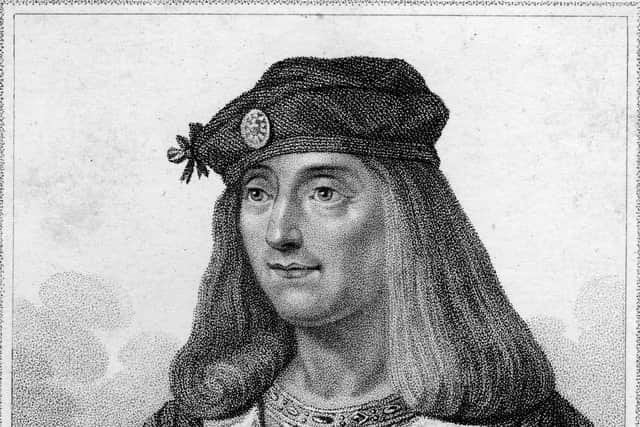How Scotland invented X-rated rap battles and King James IV was a huge fan – Susan Morrison
What offends people changes over time. Today’s re-runs of 20th-century television classics such as ‘Steptoe and Son’ are regularly preceded by warnings that viewers may find some of the attitudes and language used out-dated and offensive. They did use terms that make the eyebrows rise today, but they did not swear. Foul language was the one thing guaranteed to generate a firestorm of outrage, complete with letters to the BBC, the newspapers and even MPs.
And yet that ‘strong language’ is a part of Scotland’s culture. That big bad F word has a long history here. It once was heard in the most exalted of circles, at the royal court of James IV himself. He was an astonishing Stewart monarch. Truly tall, dark and handsome, his court attracted poets, thinkers and scientists.
Advertisement
Hide AdAdvertisement
Hide AdHe encouraged experimentation. In 1507 an alchemist at Stirling Castle, John Damian de Falcuis, attempted to fly from the battlements using feathered wings. He failed, landed in a dungheap and broke his leg. The failed flyer explained that his experiment would have worked, but chicken feathers in the wings sabotaged his efforts. James seems to have been impressed. Well, not everyone would launch themselves into thin air just to prove a theory.
‘Fenyouris, flechouris and flatteraris’
The crash-landing alchemist drew the attention of one of the most talented men at James’s court, the poet William Dunbar, who wrote the whole episode up in a scathing set of verses, "A Ballad of the False Friar of Tongland”. A graduate of St Andrews University in 1477, William may well have travelled in Europe. By 1500 he was the king’s man, producing verses of courtly love, flattering poems and bawdy verse.
Dunbar wasn’t all charm and flattery. He could be waspish. He wasn't slow to describe some at court as “fenyouris, flechouris and flatteraris’, or “liars, hypocrites and flatterers”. He was also a gloriously bawdy writer. In “The Tua Mariit Wemen and the Wedo” he ‘overhears’ a very raunchy conversation between two wives and a widow.


Dunbar wasn’t the only poet in town. James liked his court bustling and busy. There was patronage enough to support many poets, one of whom was the aristocratic Walter Kennedy. His brother was Lord Kennedy of Dunure, in the Galloway Gàidhealtachd. He could very well have written and spoken Gaelic, a language he would have shared with James IV, the last king of Scotland to speak Gaelic. He, too, was highly educated. His degree came from Glasgow, and he was ready to versify at His Highness’s command.
Poetry then was a far more dynamic beast. Much of it was written to be performed, as Dunbar and Kennedy probably and famously did. It's not hard to imagine a dreich late afternoon, perhaps at the king's luxurious Great Hall at Stirling Castle. Outside, it's still raining, shading into a cold winter evening. The court has gathered in furs and velvets. It’s a big space to heat, even with five huge fireplaces.
Flyte Club’s rules were simple
The court is there to be entertained, and the lords and ladies will be, most royally. The poets Dunbar and Kennedy are about to do verbal battle in a Flyting, a high-wire act of poetic bravado. The rules for the Flyte Club were simple. A moderator was appointed, one poet fires off a short opening challenge, the other hammers back and then they take turns insulting each other. The audience gets to choose who wins. Today’s youth would call this a rap battle. They think they invented it. The Scots got there first.
Dunbar and Kennedy limber up to show off their learning from universities of Glasgow and St Andrews. Both men will dazzle with their command of ancient legends and biblical allusions. They will sparkle with alliterative fireworks, such as “trumpour, traitour, tyran intemperate”. They will wield their skills in verse like fencers. And most importantly, they will be unbelievably offensive about each other.
Kennedy opens fire by calling Dunbar, amongst other things, a “Skaldit skaitbird”, in other words, a scabby seabird. And he then follows that up only a couple of lines later by describing the urbane court poet as a “wan f***it funling”. In the poem, this word is spelled with two letter k's, but you get the idea. The translation is roughly that Dunbar was a poorly conceived and unwanted child. He also calls him a “schit but wit”.
Advertisement
Hide AdAdvertisement
Hide AdIt seems shocking to imagine such ‘strong language’ being thrown about before the king and queen, but it's easy to imagine James giving Kennedy a regal laugh, and the court admiring the insult, wondering just how Dunbar is going to get his own back.
Reclaiming their rude glory
Oh, and he does, in fine, flourishing fashion. In his damning portrayal of Kennedy, he uses a word even further beyond the pale. He claims Kennedy has syphilis, “bitten” by a woman’s infected private parts. In today’s parlance, we’d say he dropped the ‘C-bomb’. It’s a tiny clue to the date of The Flyting, since syphilis arrived in Scotland around 1490.
This all happened before a delighted court, who saw no offence in any of these words. Such language at a modern Royal Command Performance would be unthinkable. It's amongst the earliest examples of the F-word appearing in print, in one of Chepman and Myllar’s small books from Scotland’s first printing press in 1508.
This is a peculiarly Scottish artform, but nearly forgotten. The language could explain why The Flyting of Dunbar and Kennedy isn’t taught in Scottish schools today, but there are other flytings, and not all have jaw-dropping swear words in them. We should reclaim their rude glory. They remind us that the goalposts can change when we talk about offensive language. Even kings swore once.
Comments
Want to join the conversation? Please or to comment on this article.

